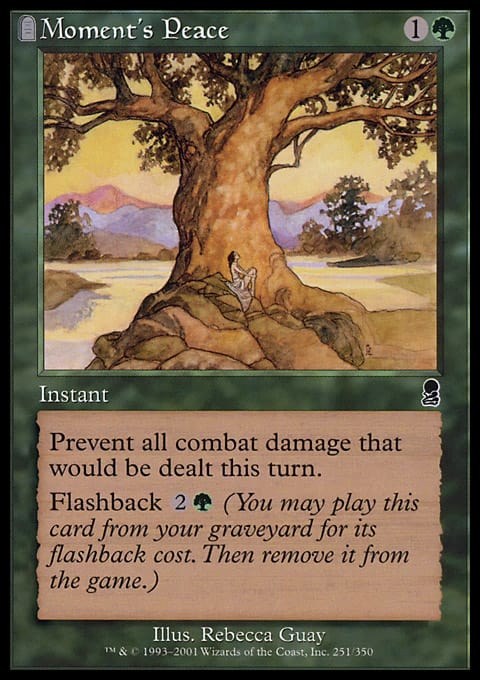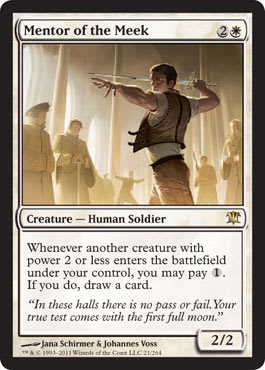Last week, I began talking about positive psychology and its practitioners’ efforts to meaningfully study happiness. This was inspired by my work teaching Magic at a facility for people with severe mental illness. While the program seemed to make a difference in some very concrete ways, such as in helping people make friends and providing motivation to participate in the treatment program, it also seemed to have an intangible effect.
A lot of people who participated in the program just seemed happier. They grew excited when Friday rolled around, like so many of us. They talked passionately among themselves and stopped me in the hallway to tell me about the changes they’d made to their decks.
Now, scientifically, this has no real weight. People who feel better are probably more likely to participate in the Magic program—or any program. And, of course, I’m going to be more than a bit biased. One of these days I would love to replicate the program and collect some real data. But it got me thinking: What is this benefit that Magic brings to our lives? We know it. We’ve felt it. But can we understand it?
This is where the positive psychology comes in. Researchers have identified three routes to happiness: positive emotions, engagement, and meaning (Seligman, Parks & Steen 1380). Each contributes to overall wellbeing, and different people tend to focus on different ones (Peterson, Park, & Seligman 36). I had instinctively built each of them into the program at the facility. And I realized that, as Magic players, we are invited to access any or all of them without ever leaving the community.
The Pleasurable Life
This is an easy place to start. As I mentioned last week, pursuing a pleasurable life is about finding positive sensory or emotional experiences (Rashid 196). It also includes consciously enjoying these experiences through practices such as mindfulness and gratitude (Seligman, Parks & Steen 1380). Another contributor to a pleasurable life is future-oriented positive emotions, such as trust and optimism (Rashid 195).
Every so often, Mark Rosewater posts letters to his Tumblr from people who use Magic to help cope with depression. I always enjoy seeing these, for both professional and personal reasons. For people who have a hard time finding the good in life, or simply don’t have that much available, a reliable source of enjoyment can be incredibly important.
I didn’t have to do much at all to incorporate this into my group. It more or less came naturally with the game. Even people who were mentally too impaired to understand the rules of the game enjoyed just looking through the art in the cards. And for the people who participated, it was a consistent source of entertainment and good company. The regularly-scheduled group, such as Friday Night Magic and prereleases, created a sense of optimism and anticipation. Thanks to some very generous people at my prereleases, I was able to bring in cards the week they came out, so the residents could look forward to the new set along with the rest of us.
This is a route to happiness that many of you probably already pursue. Wizards of the Coast works particularly hard at supporting this one. From fun gameplay to the excitement of preview season to the aesthetics of card art, you can find something to satisfy a variety of tastes. If you’ve ever had a lousy day lifted by a pickup game with a friend or made it through a dull week by looking forward to Friday Night Magic, you know this feeling.
If you don’t feel you’re getting enough of this, you may want to think about what activities make you feel the best. Competitive tournaments? Casual games with friends? Reading articles? The pleasurable life isn’t about pursuing ecstasy, but rather about having moderate positive experiences frequently (Rashid 196). By noticing these emotions, you can consciously build your schedule to make time for the activities that evoke them (Rashid 202). You can also remind yourself to pay closer attention to positive experiences in the present (mindfulness) or in the past (gratitude) and to look forward to the ones in the future (optimism).
Now, positive emotions are very important for all of the reasons I just mentioned. However, the researchers warn us, the pleasurable life has its limits (Seligman, Parks, & Steen 1380). The “hedonic treadmill” means that even as we achieve greater and greater pleasures, we quickly adjust and want more (Waterman 612). For a chance at breaking through that ceiling, we have to look to the next route.
The Engaged Life
As I mentioned last week, there is a second kind of enjoyment that is a little bit different. This is engagement: a complete absorption in what you’re doing (Seligman, Parks, & Steen 1380). Ironically, while getting the most out of pleasurable activities involves close attention to the experience and associated emotions, this is the exact opposite.
Some engaging activities are downright stressful—think about the tension of a very close game or the sometimes grueling pace of a Grand Prix. But when you are deep into them, you don’t necessarily feel the tension. You achieve flow—that state in which your attention is perfectly focused on what you’re doing and everything else falls away (Csikszentmihalyi, qtd. in Rashid 196-197). It’s not necessarily “enjoyable” in the traditional sense, and yet, people continue to seek it out. Engagement has been called “an important antidote to boredom, anxiety, and depression” (Rashid 197).
In his article, “Sculpting Flow and Fiero,” Zac Hill talked about the ways that games—and Magic in particular—are designed to induce flow. It’s certainly among the reasons I play. I am a chronic worrier with a stressful job, and that tension tends to seep into every aspect of my life. But when I’m in the middle of a good match—not boringly easy, not hopeless—for that moment, everything is in balance.
I strongly believe that this was an important reason the program at the facility was so successful. Being in a locked residential facility means a lot of waiting around to be discharged. Limited resources and safety concerns mean that a lot of the usual timewasters, such as browsing the Internet or even just going for a walk around the block, are not available. Magic provided an engaging way to pass the evenings and weekends and just let things go for a while.
And flow experiences aren’t limited to playing the actual game. According to positive-psychology pioneer Martin Seligman, engagement can be brought about by using your signature strengths. Everybody has these—characteristics that feel authentic to your core self and invigorating rather than depleting to use (Seligman, qtd. in Rashid 197). I talked about this a while back in the context of Ravnica, where people in the guilds all seem to be doing what they were made to do. You can find out your own through the University of Pennsylvania’s Authentic Happiness site.
My top three strengths were originality, curiosity, and love of learning, so it’s no surprise that research and writing are profoundly engaging for me. I’ll get up in the morning, get going, and only stop when I realize it’s 3:00 P.M. and I haven’t left my bedroom in seven hours. I do this kind of research for school and work, and yet, exercising those skills makes me want to do more rather than less. This is what it means for an activity to be engaging.
Other people have different strengths, so they find other things engaging. Some people teach us to appreciate art. Some people make that art. Some people take care of us. Except for those lucky enough to build a career around Magic, most of us do what we do out of love for the game and the community. Increasing your engagement means finding a way to show that love that feels authentic and invigorating to you.
The Meaningful Life
While using signature strengths is rewarding for its own sake, the third route to happiness involves using those strengths toward a greater purpose (Rashid 198). While that phrase has a bit of a spiritual overtone, that purpose can take a variety of forms: the well-being of your family, a meaningful career, or even an ideal such as justice or knowledge, as examples. This is why volunteering is so powerful; this is what provides the sense that life has meaning (Rashid 198–199).
I don’t know if this is new or if I’m just now noticing it, but over these last few years, there seems to have been a spate of people turning their interests in Magic toward altruistic ends. Giving to the next generation seems to be particularly popular, whether it’s Gamers Helping Gamers giving money or Bruce Richard giving his time. The facility program was run entirely on donations, from strangers as well as my friends and family. Many judges seem to take a meaning-based approach, focusing on guiding the newer judges or addressing issues of inequality.
When I started the program, I didn’t want the residents to feel like charity cases. I emphasized the fact that giving free cards to new players is common and part of being a caring community. The residents, in turn, mentored newcomers to the facility and even donated some of their cards back to the pool. They were also active in improving the group for everybody, leading activities and coming up with new ideas. Even in very restrictive situations, it is possible to make meaning.
If you want to go further down this route, consider what kind of cause is important to you and how you can use your strengths and resources to support it. I started transcribing Drive to Work for my own reference, but my concern for disability issues and the reaction from hearing-impaired fans has made it increasingly important to me. Can you volunteer to teach Magic at a program for kids or people with disabilities? Learn or teach about what it’s like to be someone outside the mainstream? Pack up people’s spare cards and sending them to a program like Books for Soldiers? (Last time I checked, they were very interested). You don’t need money, and you don’t need a lot of time. Everyone has something to contribute.
The Full Life
“The full life” refers to combining all three of the routes to happiness (Seligman, Parks, & Steen 1380). Accordingly, I see the lifestyle surrounding Magic as very full in that it provides opportunities to pursue any of the three that you wish. The pleasurable life, the engaged life, the meaningful life—I hope you find happiness in our game and our community, whatever path or paths you take to get there.
Works Cited
- Peterson, Christopher, Nansook Park, and Martin E.P. Seligman. "Orientations to Happiness and Life Satisfaction: The Full Life vs. The Empty Life."Journal of Happiness Studies. 6. (2005): 25-41. Web. 6 Oct. 2013.
- Rashid, Tayyab. "Positive Psychotherapy." Positive Psychology: Exploring the Best in People. Westport, CT: Praeger, 2008. Web.
- Seligman, Martin E.P., Acacia C. Parks, and Tracy Steen. "A Balanced Psychology and a Full Life."Philosophical Transactions of the Royal Society. 359. (2004): 1379-1381. Web. 6 Oct. 2013.
- Seligman, Martin E.P., and Mihaly Csikszentmihalyi. "Positive Psychology: An Introduction." American Psychologist. 55.1 (2000): 5-14. Web. 6 Oct. 2013.
- Waterman, Alan S. "On the Importance of Distinguishing Hedonia and Eudaimonia When Contemplating the Hedonic Treadmill." American Psychologist. 62.6 (2007): 612-613. Web. 6 Oct. 2013.

























